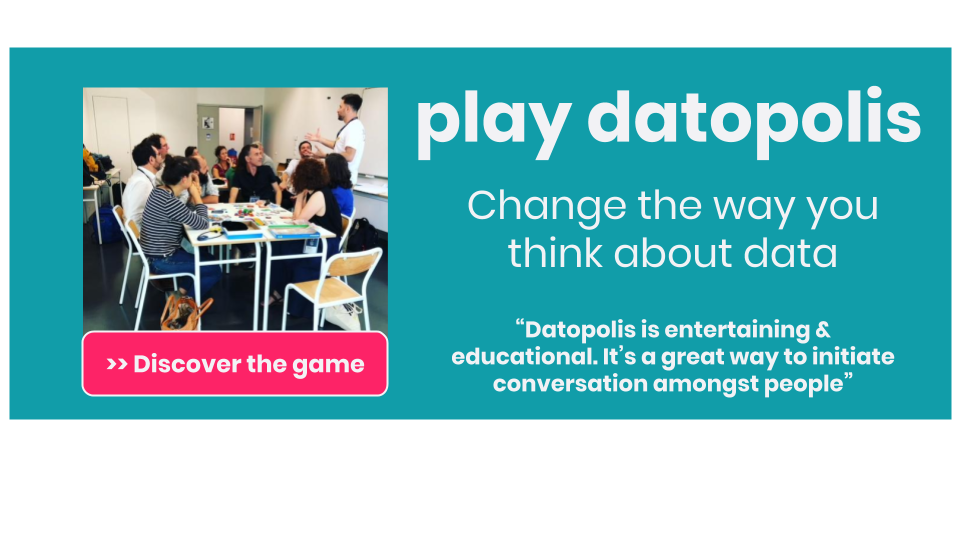“We don’t stop playing because we grow old; we grow old because we stop playing” – George Bernard Shaw.
From artificial intelligence to blockchain data is a renewable resource that’s powering innovation and changing the way we work. This change means many of us will need to adapt and learn if we’re to thrive in this exciting, but often daunting, data-driven world. But, getting started with data skills isn’t always easy. That’s where games like Datopolis come in. They help kick-start the data literacy conversation, catalyse change and bring fun to a topic that can sometimes feel technical and dry.
Here are seven reasons games should be a part of the data skills projects or events you’re involved in.
-
Games are a safe way to sort out any elephants in the room.
In this case, that pesky elephant is impostor syndrome. Impostor syndrome is the feeling that you don’t belong in a group or a situation because everyone else is more “expert” than you. I’ve found it’s rife in the data sector. Particularly amongst leaders, who often understand that data is changing their world, but don’t feel they know enough about what’s happening, what they should do about data, and what the heck “data” actually is anyway. A game can help you address some of these fears and build basic data literacy in a fun, non-threatening way.
-
Games replace fear with fun.
Our pleasure receptors are still receptive as we get older, so most people jump at the chance to have fun. And the prospect of having fun replaces the fear we can feel about learning or trying something new, especially if we’re burdened by an impostor elephant (see above). And fun is important for learning because…
-
Adults learn more when they’re having fun.
It’s not just children who benefit from learning through gameplay. Research shows that games, particularly those that are enjoyable, improve learning and the retention of new skills in adults. Games do this by keeping people motivated, providing a safe place for experimentation and by stimulating the cognitive functions associated with learning and retention.
-
Games capture people’s imagination.
Spoiler alert – it’s not just kids that like to have fun. In fact, recent research shows that the average age of gamers is 35 years. This suggests that you’ll find gaming enthusiasts in most work environments. Offer people the chance to learn something new about data, in a fun way, and I guarantee you’ll get their attention and you’ll get people to not just turn up, but stay involved.
-
Data isn’t just about tech it’s about culture.
Yes, you might need some fancy tools to do your data work. You may even need to build a team of shiny data scientists and analysts. But, for data to make a real impact on your business, it takes more than tech. It takes real change. And this often means changing the culture of an organisation and sometimes a whole sector. Games can help people explore how different ways of working are essential for effective data work. For example, the open data board game Datopolis, demonstrates how using data to collaborate with both competitors and colleagues, can be an effective strategy for business growth.
-
Data concepts can seem abstract if not applied.
Without months or even years of practical data work it’s difficult to provide people with practical experience of some tricky but important data concepts. Games can give people an opportunity to experience how data concepts such as data strategy, data infrastructure, and data formats play out in practice. And, because it’s a game it doesn’t matter when people get things wrong.
-
Data games stimulate discussion and debate.
By providing a safe space for experimentation, well-facilitated games get people talking. The energy and excitement games generate make for healthy post-game debates. And because most game rules create a level playing field for participants, that helps make discussions more open, by making it a bit easier to ignore any hierarchies in the room. People can raise questions using the framing of the game, which sometimes feels like a safer way to address thorny organisational issues such as strategy, process or leadership.
Games are fun. They aren’t everything. And they certainly aren’t everything you need to improve data literacy. However, by bringing energy and something new to data they can play an important role in getting things going in the right direction. After all, getting real value from data often means doing things differently. And, what better way to illustrate that than by integrating something unexpected and innovative like a game?
Intrigued about the potential for data games in your work? Check out Datopolis the open data board game and simulation.





